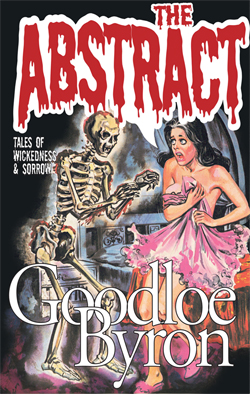“I have always admired people who just seize something and run it into the wall,” said Georgetown alumnus Goodloe Byron (COL ’04), author of what is more easily labeled an ambitious experiment than a novel. The Abstract: Tales of Wickedness and Sorrow is a demonstration of one man’s ability to take something and run with it, both within the novel in its destructive and nihilistic undertones—and in Byron’s real world effort to give away over 10,000 copies of his book, free of charge.
During his pro-bono employment as a cover artist for Soft Skull Press, Byron learned the ins-and-outs of the publishing industry. This, together with the man’s willingness to run up a little debt, culminated in the creation at hand.
“I don’t really have many expectations for what will come from this, but at the same time I made a vow to do it,” Byron said, explaining his attraction to fantastical ideas.
“I think everybody has flights of fancy about embarking on some bizarre quest, and sometimes it’s good to grab hold of the fantasy and force yourself to try to more or less realize it, otherwise it will just pass by, meaning nothing.”
With thousands of copies of The Abstract in hand, Byron made the trek of a lifetime, demonstrated on the novel’s website by a map of the United States that looks somewhat like an advertisement for where Verizon Wireless service is available.
Still, Byron’s journey ultimately represented much more of a personal exploration than an effort to hype his novel.
“I have talked with all stripes of madmen and many intelligent people and have seen many things I would not have were I left to my own devices,” Byron said.
The Abstract is a notable read on its own merits, though with significant caveats. The prose style, characters, plot, and overall structure of the text betray its origins as more of a “little essay,” as Byron termed it. And while Byron admits that he may have ripped off some of his favorite writers stylistically (ahem, Bukowski), his nihilistic approach is entirely his own.
The book, while not offering any conspicuous social commentary, seeks to demonstrate the negative space of humanity and our pursuits, by constantly demeaning his protagonist:
“Not only do we follow a strange person of zero historical value, and in a sloppy chunky unprocessed prose style, but we also follow him through banal time almost exclusively, buying groceries and using the toilet, things that occupy the majority of our time, but we consider peripheral.”
Byron’s fantasy has not ended yet, as he soon plans to embark on his third book tour in conjunction with The Abstract, with another few thousand books in tow. In the meantime, the Maryland local regularly places the books in coffee shops throughout the metro area. If you’re looking for an ontologically-oriented social essay, and can pay Metro fair, head over to Murkey Coffee or Java Hut in Arlington, or Sobo Coffee in Dupont Circle, and pick up a copy for yourself. You never know who you might meet along the way.






